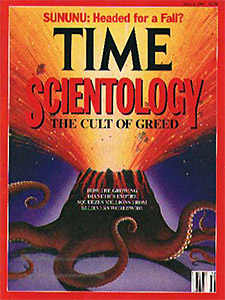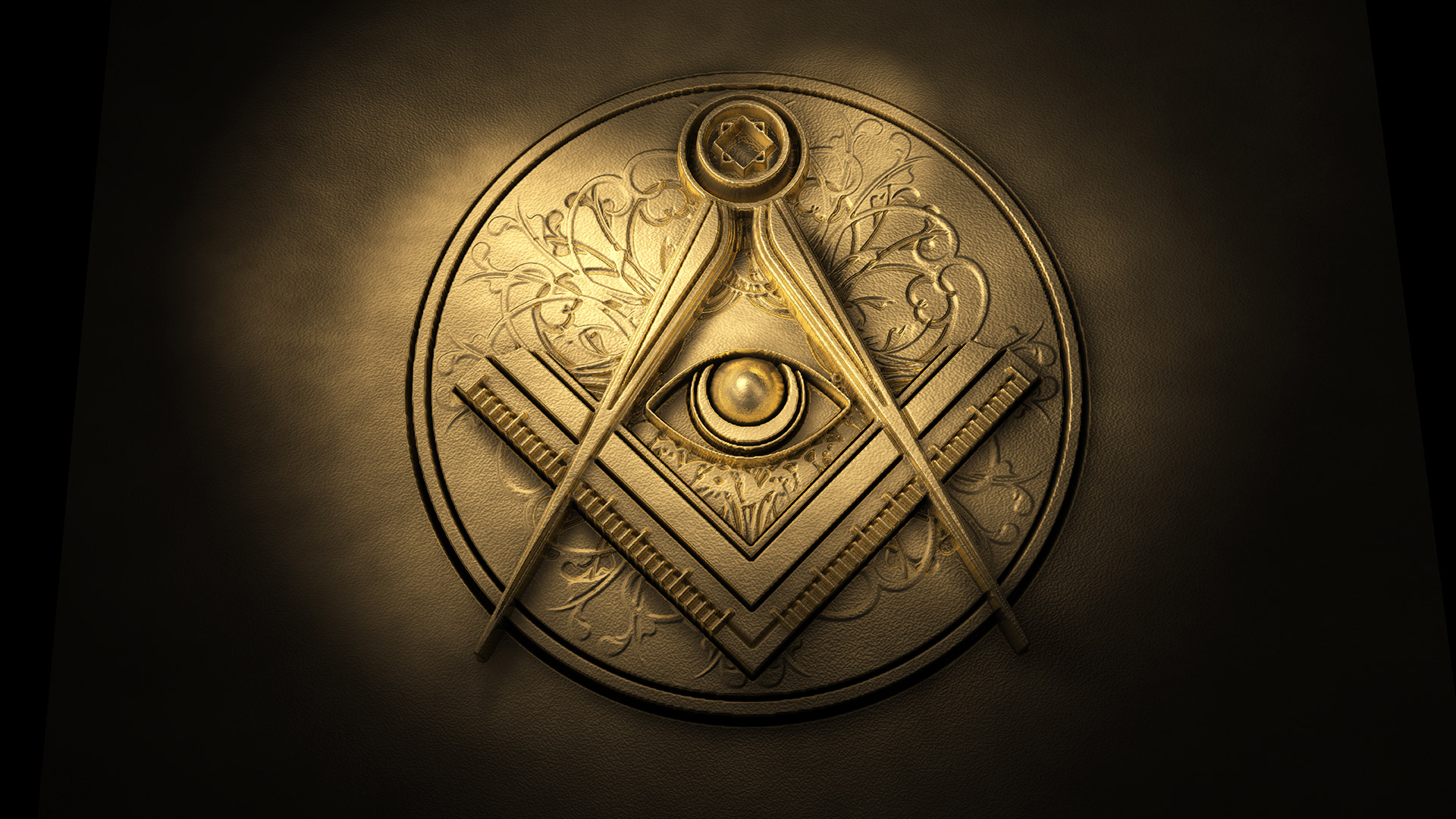Scientology
The cult of the elite.
By Dennis Pollock

“But I fear, lest somehow, as the serpent deceived Eve by his craftiness, so your minds may be corrupted from the simplicity that is in Christ.” (2 Corinthians 11:3)
It happened during the filming of a quickly forgotten horror film, The Devil’s Rain, in 1975. John Travolta had come down with a severe cold and sore throat. Actress Joan Prather told young Travolta that she could help him, using a technique known as “touch assist.” Travolta declared later, “The sore throat went away, so then I knew something was really working here I needed to find out more about it.”
Such was John Travolta’s introduction to the doctrine of Scientology. It turned out to be more than a passing fad. Over twenty years later, Travolta still holds to the doctrines enunciated by Science Fiction writer L. Ron Hubbard. “I don’t know why people are afraid of it,” he said. “It’s given me a better quality of life and a hope for mankind.”
Scientology has received a lot of free publicity in recent days due to the proportionately high incidence of celebrity converts. Along with Travolta, Tom Cruise and his former wife Nicole Kidman, Sharon Stone, Mimi Rogers, Shirley Maclaine, Kirstie Alley, Demi Moore, Priscilla Presley and daughter Lisa Marie have all been reported to have been involved in this mysterious “church.”
When Germany tried to crack down on Scientology, Hollywood rallied around the faith of its box office brethren, taking out a full page advertisement in the International Herald Tribune. It was addressed to Chancellor Helmut Kohl, and likened the government’s restrictions on Scientology to the Nazi’s persecution of the Jews in the 1930’s. The ad was signed by Goldie Hawn, Dustin Hoffman, Oliver Stone, Aaron Spelling, and 30 other Hollywood luminaries.
The Message
So what is Scientology? Founder Ron Hubbard was convinced that the answer to all life’s problems and pressures could be found in the principles of “dianetics” (a word he coined first in a science fiction novel). Dianetics is a type of therapy which weaves pop psychology with eastern mysticism.
One of the primary means of applying the principles of dianetics to one’s problems is by use of an “E-meter.” This consists of a small box with two electrodes attached that passes a current of 1.5 volts through the body and registers the result on a needle that swings all over the place in a manner similar to a lie detector.
A more experienced Scientologist listens as the participant is encouraged to discuss their past failures and problems. When the subject can talk about these without causing the needle to careen across the gauge, they are said to be “clear” (freed from all bondage).
The Theology
The theology that is behind all of this is almost too incredible to be believed. According to Hubbard, seventy-five million years ago a tyrant named Xenu ruled the Galactic Confederation, an alliance of 76 planets, including planet Earth. To control overpopulation and solidify his power, Xenu instructed his loyal officers to capture beings of all shapes and sizes from the various planets, freeze them in a compound of alcohol and glycol, and fly them by the billions to Earth in planes resembling DC-8s.
These beings were deposited or chained near 10 volcanoes scattered around the planet. After hydrogen bombs were dropped on them, the spirit beings that inhabited their bodies (called body thetans or engrams) were captured by Xenu’s forces and implanted with sexual perversion, religion, and other notions to obscure their memory of what Xenu had done.
Soon after, however, a revolt erupted and Xenu was imprisoned in a wire cage within a mountain where he remains today. These body thetans that he had perverted have been running rampant ever since attaching themselves to human bodies and bringing about all sorts of miseries and bondage.
Thus, in the gospel according to Hubbard, all our problems have to do with these twisted little spirit critters that attach themselves to our body. By means of the principles of dianetics, and the use of the “E-meter” we can be freed from these engrams and join the enlightened ones.
That anyone would believe such nonsense is surprising; that sophisticated Hollywood types would buy this garbage is amazing. When many of their secret writings got posted on the Internet, Scientology leaders went ballistic. Lawsuits flew in every direction, along with dire warnings that anyone reading some of their deep teachings without proper training could die. One Internet denizen quipped about their threats, “This may be true… while reading [their stuff] I almost died laughing.”
The Originator
Ron Hubbard has to be the most unlikely of men to start a world religion. The portly science fiction writer made some fantastic claims, but many of them are being called into question. In 1948, he is reported to have remarked to a colleague that the best way to make money would be to start a religion.
He served in the Navy in World War II, and there is a major contradiction as to his service record. Scientologists claim Hubbard received 29 medals, including a Purple Heart, and that after being injured by a bomb exploding in his face, he was flown home in the secretary of the Navy’s private plane as the first U.S. returned casualty from the Far East.
But when the Los Angeles Times received Hubbard’s actual military, V.A., and medical records, they found things differently. Hubbard’s service record shows that he never saw action against the enemy, and that he was given only four awards, none of which was the Purple Heart. Naval records described Hubbard in very unglamourous terms: “By assuming unauthorized authority and attempting to perform duties for which he has no qualification he became the source of much trouble. He is garrulous and tries to give impressions of his importance.”
In his latter years, Hubbard claimed to have developed techniques that remove mental blocks and facilitate the healing of the body. His “Principles of Dianetics” were supposed to alleviate nearly all physical maladies. Yet Kim Douglas testified in court that while she attended him from 1975 to 1980, he suffered from arthritis, bursitis, and coronary trouble. The Los Angeles Times reported that Hubbard began receiving a 40% disability award from the Veterans Administration from 1948 through at least 1980. Hubbard died in 1986 of a stroke.
Scientologists might tell you that their beliefs are in no way contradictory to Christianity. Consider some of Hubbard’s own words and decide for yourself:
“The whole Christian movement is based on the victim… A Scientologist is not a victim… We can win by converting victims.”
“It is despicable and utterly beneath contempt to tell a man he must repent, that he is evil.”
“Nobody but the individual can die for his sins.”
“Hell is a total myth, an invention to make people unhappy and is a vicious lie.”
What’s the Hook?
The obvious question that arises when reading through the fantasy and theological drivel that Mr. Hubbard has promulgated is, “Why would anyone believe such garbage?” And yet there is no doubt that Scientology, with its engrams, body thetans, and E-meters, is a popular movement today. The Scientology Bible, “Dianetics,” has sold 16 million copies, and the organization claims 8 million members worldwide. Scientology obviously has some sort of appeal to it.
It is interesting to note the vast number of people who indulge in exotic fantasy religions, with far-out theories and teachings that stagger the imagination. It would be reasonable to suppose that those types of religions might gather in a few weak, simple minded folks, or those who have been so beaten down by life that they are willing to try anything. But such is not the case. We often find some of the most intelligent and outwardly successful people trapped in cults with the most irrational and far-fetched of doctrines.
The answer to this dilemma lies in looking at the two basic alternatives that people are faced with. The first is secular humanism. This concept says that nothing is spiritual; all is material. There is no soul or spirit, no Heaven or Hell, no God or devil only matter. We exist only as the result of a billion to one chance combination of primeval elements. We will soon die and end our meaningless, purposeless lives.
The problem with this alternative is that it inevitably leads to pessimism and nihilism. Robert Ingersoll, a leading British evolutionist, and skeptic of his day, expressed the ultimate sadness of the unbeliever in an address at the graveside of his brother: “Life is a narrow vale between the cold and barren peaks of two eternities. We strive in vain to look beyond the heights. We cry aloud, and the only answer is the echo of our wailing cry.”
An anonymous taxi cab driver put it rather eloquently in his own way: “We are here to die; just live and die. I drive a cab. I do some fishing. I take my girl out. I pay my taxes. I do a little reading. Then I get ready to drop dead. You gotta be strong about it. Life is a big fake.”
What about the Gospel?
The other major alternative is of course Jesus Christ. At first glance it would seem that Christianity should be the natural choice of nearly everyone. It offers purpose for living, absolution from guilt, a relationship with a loving Father, the promise of eternal life, and the promise of divine response to our prayers.
The Scriptures present a rational and intelligent view of God and man, and the doctrine of man’s sinful nature is attested in every nation and among every race of people. Why don’t John Travolta, Tom Cruise, Demi Moore and the others come running to the cross of Jesus?
Jesus Himself addressed this issue when He declared, “And this is the condemnation that light has come into the world and men loved darkness rather than light because their deeds were evil. For everyone doing evil hates the light and does not come to the light, lest his deeds should be exposed. But he that does truth comes to the light, that his deeds might be made manifest, that they are done in God” (John 3:19-21).
People cling to silly, vain philosophies rather than Christ, because they instinctively know that Jesus makes demands of our lives. Although His salvation is free and by grace alone, He insists that all who will enter His kingdom repent and turn away from those things that His word condemns.
Scientology, of course, makes no such demands. That is why Demi Moore can profess Scientology and still take off her clothes and parade her body before millions of men in films. That is why Shirley Maclaine could acknowledge living in an open marriage relationship for years, feeling the freedom for sexual trysts with various lovers while professing great respect for philosophy, self-fulfillment, and the doctrine of reincarnation.
The gospel does indeed make demands. When John the Baptist came preaching in the wilderness, his message was, “Repent, for the kingdom of heaven is at hand” (Matthew 3:2). When Jesus followed him six months later, He likewise cried out to people to repent (Matthew 4:17).
Likewise, when Jesus sent His twelve disciples forth to preach the good news, the Bible tells us that they went out and preached that men should repent (Mark 6:12). And when Peter was asked what to do by anxious Jews whose hearts had been touched by the truth of the gospel, his first word to them was, “Repent” (Acts 2:38).
The Good News
The good news is that it is the grace of Jesus that makes repentance possible. As we look to Him in faith, believing that He died on the cross for the forgiveness of our sins, and that He rose again the third day, we are given grace to repent and turn from our wicked ways. We receive a new nature which hates evil and loves righteousness. The only begotten Son of God gives us the gift of His nature which immediately goes to work powerfully within us.
If you have never receive Christ as your Savior, if you have no assurance in your heart that you have been born again, I urge you to receive Christ as your Savior and Lord this very day. “For as many as received Him, to them gave He the right to become the children of God” (John 1:12).




